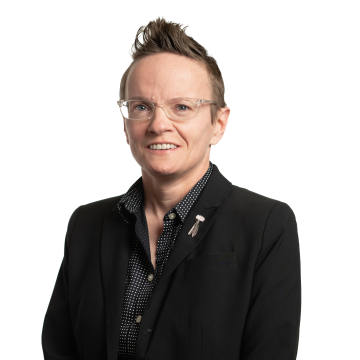Megan Treuer
2025 Bush Fellow

Tribal court judge | Anishinabe justice revitalizer | Force for cultural healing
Megan Treuer is working to return justice in Indian Country to its roots, where healing, collective accountability and cultural restoration lead the way. A Tribal court judge for more than a decade, Megan has built and led transformative justice initiatives that reflect traditional Anishinabe values, from joint jurisdiction wellness courts to a family dependency court that helps keep children with their parents through culturally grounded recovery. Her work has helped both state and Tribal courts embrace Indigenous knowledge and language as pathways to healing.
As the daughter of one of Minnesota’s first Native attorneys and the country’s first (known) female Native American judge, Megan inherited a sacred responsibility to carry forward the work of justice for her people. She is now called on nationally to present on Tribal law, Anishinabe justice, intergenerational healing and cultural revitalization within Tribal, state and federal legal systems. She is known for her exceptional ability to listen deeply and engage people from all walks of life, earning broad trust and respect.
With the Bush Fellowship, she will reduce her judicial caseload to focus on self-renewal, deepen her Ojibwe language fluency, participate in seasonal ceremonies, visit Indigenous justice leaders and document the history of Anishinabe justice as a foundation for the next generation.
What does leadership mean to you?
As an Eagle Clan member, I embrace the role of the ogimaag, responsible for leading our community through collective decision-making and being a voice for the people. I grew up near the Leech Lake Reservation and was deeply engaged in my community’s culture. My light complexion often led others to perceive me as non-Native, giving me a unique perspective on the challenges faced by those who are visibly Indigenous and fueling my passion to advocate for those whose voices are often disregarded.
What change are you trying to create?
I want to fully indigenize our justice systems. Too many Tribal courts mirror the punitive frameworks imposed by colonization. But our ancestors practiced a justice of belonging, healing and community accountability. I’ve seen the lower rates of recidivism and better outcomes when people are connected with their cultural practices. When young people receive Ojibwe names or are sent into ceremony instead of jail, the outcomes are far better. We’ve protected and preserved our language, our ceremonies and our ways. Now is the time to embed them fully into how we define and deliver justice to the masses.